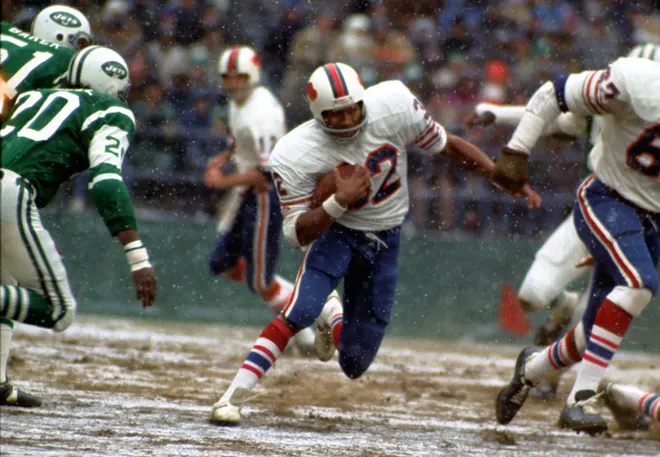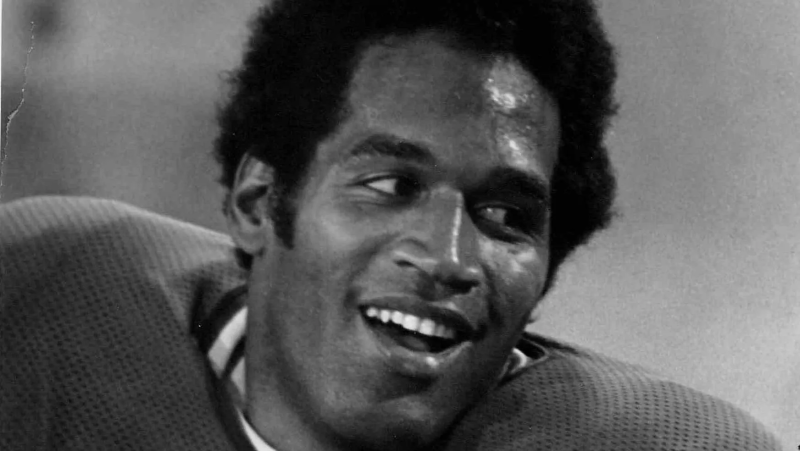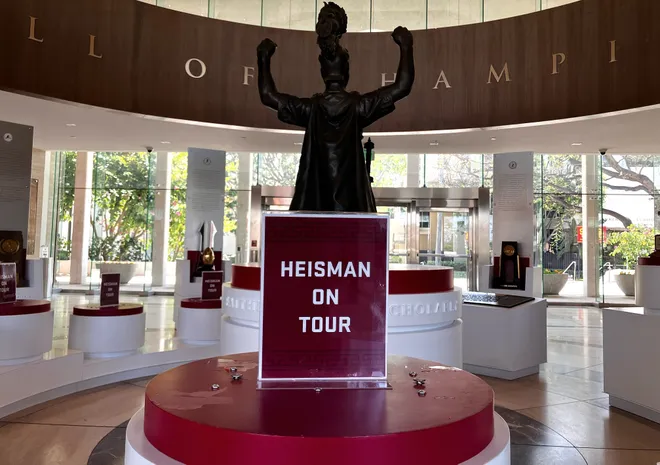Celebrating O.J. Simpson's football feats remains a delicate balance for his former teams
In the hours after O.J. Simpson's family announced Thursday that he had died of cancer at 76, some of the entities that had previously celebrated his football career − including the Pro Football Hall of Fame and Heisman Trophy Trust − issued statements or offered condolences to his loved ones.
Others, notably, did not − including the University of Southern California, the Buffalo Bills and the NFL.
It's nothing new. For decades now, the football entities that have honored or been associated with Simpson have continued to acknowledge his accomplishments on the field while apparently avoiding to spotlight him − or acknowledge, in any substantial way, the 1994 double-murder case and acquittal that took him from fame to infamy.
From the University of Southern California, where he starred as a college player, to the Buffalo Bills, with whom he won four rushing titles, Simpson has not been erased from any record books because of his legal issues, nor removed from Halls of Fame to which he was inducted. But he hasn't exactly had statues erected in his honor, either − a tacit recognition that his legacy off the football field has come to dwarf his statistics on it.

Pro Football Hall of Fame
The Pro Football Hall of Fame published a news release in the immediate aftermath of Simpson's death, as it does following the deaths of other members. But it did not reference anything from his retirement, including the double-murder case that became a cultural phenomenon.
NFL DRAFT HUB: Latest NFL Draft mock drafts, news, live picks, grades and analysis.
"O.J. Simpson was the first player to reach a rushing mark many thought could not be attained in a 14-game season when he topped 2,000 yards," Hall of Fame president Jim Porter said in a statement. "His on-field contributions will be preserved in the Hall’s archives in Canton, Ohio."
Hall of Fame spokesperson Rich Desrosiers said Simpson's legal issues are not acknowledged at the museum in Canton, though he clarified that the Hall's materials on members largely revolve around their on-field accomplishments. Online player biographies, for example, rarely reference any aspect of a Hall of Famer's post-retirement life.
Simpson was ultimately acquitted of killing his ex-wife, Nicole Brown Simpson, and one of her friends, Ron Goldman, in what came to be colloquially known as the trial of the century, though he was later found liable for the deaths in a civil case in 1997.
Roughly a decade later, he was sentenced to prison time in connection with a botched armed robbery.

University of Southern California
Following Simpson's release on parole in 2017, then-Trojans football coach Clay Helton told reporters that the school's former star running back would not be welcomed back to campus.
"Right now with USC, what the administration and the athletic department have said is, no, O.J. will not be a part of our functions. That’s been the statement," Helton said at the time.
Simpson remains a member of the USC Athletics Hall of Fame, however. And The Los Angeles Times reported in 2019 that his jersey remained on display at the Los Angeles Memorial Coliseum alongside those of other former Trojans who won the Heisman Trophy. (An athletics department spokesperson did not reply to a message seeking clarification on whether that is still the case.)

Simpson's No. 32 is also one of five jersey numbers that has been retired at USC, according to 247 Sports.
Timeline of O.J. Simpson's life: From the Heisman to white Bronco chase and murder trial
Buffalo Bills
Simpson was drafted No. 1 overall by the Buffalo Bills and spent the bulk of his 11-year professional career with the franchise, earning six Pro Bowl nods and one MVP award over nine seasons.
In 1980, he was inducted into the team's "Wall of Fame," which was created "to honor former players, administrators and coaches who have played significant roles in the team's history." He remains a member of the group, whose names are displayed on the interior walls of Highmark Stadium, though there have been calls in recent years for him to be removed from the "Wall of Fame," including by a state lawmaker in 2021.
"While he was found 'not guilty' of the homicide of his ex-wife, Nicole Brown and her friend Ronald Goldman, Simpson was found to be legally responsible for their deaths by a civil jury," Assemblyman Patrick Burke wrote in a letter to Bills owners Terry and Kim Pegula, requesting the change. "O.J. Simpson's name remaining on the wall sends a harrowing and distorted message to survivors of domestic violence that abuse is condoned."
Unlike USC, however, the Bills have not retired Simpson's jersey number. After a 42-year hiatus, running back Senorise Perry was told in 2019 that the number was available for use and decided to don it. The number currently belongs to cornerback Kyron Brown.
A Bills spokesperson did not immediately reply to a message Thursday asking if the team had any comment on Simpson's death, or if the former running back is honored in any other manner at team facilities, beyond the Wall of Fame.
Contact Tom Schad at tschad@usatoday.com or on social media @Tom_Schad.
Disclaimer: The copyright of this article belongs to the original author. Reposting this article is solely for the purpose of information dissemination and does not constitute any investment advice. If there is any infringement, please contact us immediately. We will make corrections or deletions as necessary. Thank you.







